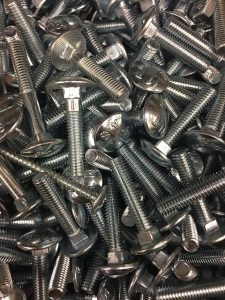
When using fasteners to build an airplane, you should take precautions to prevent galling. Fasteners are commonly used in the construction of airplanes. A typical Boeing 747 has over 3 million fasteners. Regardless of the specific type of airplane with which they are used, threaded fasteners may succumb to galling.
What Is Galling?
Also known as thread galling, galling is a phenomenon in which a threaded surface unintentionally sticks to another metal surface due to friction. It may occur with bolts and nuts, for instance.
As a bolt and nut rub together, they may fuse together. Friction and heat created during rubbing will break down their respective surfaces, at which point the bolt and nut will adhere to each other. Galling involves threaded fasteners sticking together as a result of friction.
Choose High-Quality Fasteners
You can prevent galling by choosing high-quality fasteners. Some fasteners are stronger and more durable than others. You can expect to pay more for high-quality fasteners such as these, but it will pay off in the form of better protection against galling. High-quality fasteners can withstand more friction-related stress without succumbing to galling.
Start Slow When Installing and Removing
Another tip to prevent galling is to use a slow speed when installing, as well as removing, threaded fasteners. You can still use power tools, but be conscious of the speed. Attempting to install or remove a threaded fastener with the fastest speed setting may result in galling. The power tool may turn the bolt or nut so quickly that it leads to galling.
To prevent this phenomenon from occurring, set your power tool to a slow speed setting while gradually increasing the speed setting as needed.
Use Anti-Seize Lube
You may want to use anti-seize lube to protect against galling. Anti-seize lube is a type of lubricant that’s designed to prevent fasteners and parts from seizing and galling.
When lubricated with anti-seize lube, threaded fasteners will experience less friction. You can install and remove them without exposing them to severe friction. The end result is better protection from seizing and galling.
Beware of Dirt and Debris
Clean fasteners are less likely to succumb to galling than their dirty counterparts. Allowing dirt and debris to build up on fasteners is a serious mistake. When you install or remove them, they will be severe friction. The dirt will rub against the surface of the fasteners while placing them at risk for galling.



